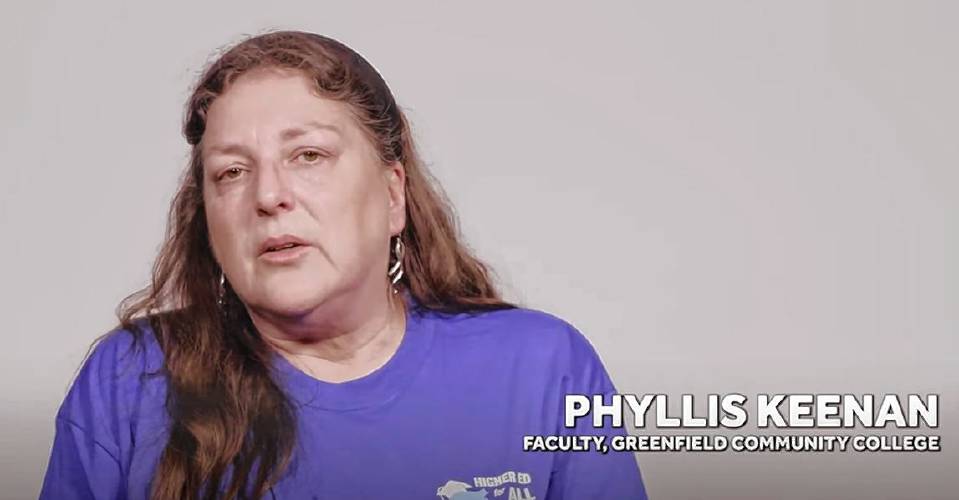GCC professor speaks out in TV ad for CHERISH Act
| Published: 12-26-2023 2:49 PM |
GREENFIELD — A Greenfield Community College professor is one of three Massachusetts educators featured in a new television ad urging lawmakers to pass the CHERISH Act, which seeks to provide a more affordable path to a college degree for students and improve wage equity among faculty members.
In the ad, GCC math professor Phyllis Keenan said she decided to speak out because she’s seen firsthand the impact that crushing college debt has on students’ lives.
“The CHERISH Act would provide debt-free higher education,” she said. “That’s exactly what our families and communities need, and it’s what our students need.”
The new campaign went live on television earlier this month, as well as on social media platforms such as Facebook, Instagram and YouTube, according to the Massachusetts Teachers Association, which is spearheading the campaign. It will run in cities and towns across Massachusetts, reaching a wide range of students, families, lawmakers and voters.
“I was happy to be asked because it’s something I really believe in,” said Keenan, who has a 25-year career in teaching. “It will make such a big difference for all.”
The CHERISH Act — an acronym for “committing to higher education the resources to insure a strong and healthy” public higher education system — seeks to achieve wage equity between full-time and adjunct faculty, as well as ensure eligibility for state health care and retirement benefits for adjunct and part-time staff. It also aims to invest money in high-need students and create a program enabling public higher education to be debt-free.
“Both of those pillars of the CHERISH Act are enormously important,” said Trevor Kearns, president of the GCC chapter of the Massachusetts Community College Council union. “Our students need help to go to school and we need help to continue to teach them. The community colleges overwhelmingly service marginalized populations and in the same way those populations are marginalized, the people who work in community colleges are marginalized.”
Kearns said he knows many professors who are also working elsewhere as adjunct faculty members just to make ends meet. Keenan at one point was teaching seven classes across four schools.
Article continues after...
Yesterday's Most Read Articles
 Retired police officer, veteran opens firearms training academy in Millers Falls
Retired police officer, veteran opens firearms training academy in Millers Falls
 UMass graduation speaker Colson Whitehead pulls out over quashed campus protest
UMass graduation speaker Colson Whitehead pulls out over quashed campus protest
 As I See It: Between Israel and Palestine: Which side should we be on, and why?
As I See It: Between Israel and Palestine: Which side should we be on, and why?
 Real Estate Transactions: May 10, 2024
Real Estate Transactions: May 10, 2024
 Baseball: Caleb Thomas pitches Greenfield to first win over Frontier since 2019 (PHOTOS)
Baseball: Caleb Thomas pitches Greenfield to first win over Frontier since 2019 (PHOTOS)
 High Schools: Greenfield softball squeaks out 1-0 win over Franklin Tech in pitchers duel between Paulin, Gilbert
High Schools: Greenfield softball squeaks out 1-0 win over Franklin Tech in pitchers duel between Paulin, Gilbert
“I made it work,” she said. “Sometimes it’s challenging keeping track of everything.”
With the recent passage of MassReconnect, which offers free community college to students ages 25 and older, the need to support teaching staff is even greater, she said.
“We did see a community college enrollment increase,” Keenan noted. “We’re looking now at how we can sustain that, and the CHERISH Act is part of how we sustain it. We need to have more support staff … to support the students. We also need better pay and job equity for the faculty and staff because as more students come, we need to have more people to support them.”
Both Keenan and Kearns argued the CHERISH Act should be viewed as an investment into the state economy.
“Students who graduate from a community college and other public institutions … have a higher rate of staying in the state and keeping jobs here, and buying their house and living here,” Keenan said. “It’s an investment into the economy of our state.”
To view the TV ad that features Keenan, visit bit.ly/47egfPq.
Reporter Mary Byrne can be reached at mbyrne@recorder.com or 413-930-4429. Twitter (X): @MaryEByrne.



 New USDA offices in Greenfield to aid staffing increase, program expansion
New USDA offices in Greenfield to aid staffing increase, program expansion Montague Notebook: May 10, 2024
Montague Notebook: May 10, 2024 Deerfield’s Tilton Library expansion ‘takes a village’
Deerfield’s Tilton Library expansion ‘takes a village’
